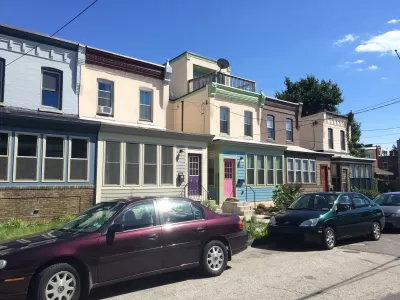Minneapolis is setting a bold example by ending single-family zoning, but chances are a similar change won’t be coming to Philadelphia.

Minneapolis recently approved a plan to eliminate single-family zoning in a move to address housing affordability and a legacy of racial segregation. Jake Blumgart says such a zoning change is not politically realistic in Philadelphia, where city council members are much less inclined to support such a measure. In fact, they have not supported upzoning efforts or a plan to add accessory dwelling units to the city’s zoning code.
Still, Blumgart says considering what is happening in Minneapolis and differences between the two cities can be useful. For one, Philadelphia does not appear to be facing an affordable housing crisis like Minneapolis, and the city's row houses and smaller lot sizes mean more density. Philadelphia also has a higher rental vacancy rate and a lower median home sale price.
Philadelphia’s housing challenges are less about availability and more about providing resources to low-income residents, says Blumgart:
The principal housing issue facing Philadelphia is that most low-income residents live without subsidies and can barely afford their rent. No matter how many units are built, the price reductions that stem from greater supply are not large enough to help the poorest.
He also notes that homeownership rates are higher in Philadelphia than in Minneapolis and similar racial segregation patterns have not emerged across the city.
In addition, Blumgart points out that Philadelphia is a Democratic city, but it is not as politically progressive as Minneapolis. "Minneapolis’s radical zoning overhaul is the fruit of a sweeping turnover on its city council and a willingness to try new strategies in the face of an incipient housing crisis."
What is the overall takeaway for Philadelphia? "Experts say that policymakers don't have to necessarily export the Minneapolis plan but should instead analyze where market demand is hottest and where it is likely to move next, and zone accordingly," says Blumgart.
FULL STORY: 3 reasons why Philadelphia won’t follow Minneapolis’s ban on single-family zoning

Maui's Vacation Rental Debate Turns Ugly
Verbal attacks, misinformation campaigns and fistfights plague a high-stakes debate to convert thousands of vacation rentals into long-term housing.

Planetizen Federal Action Tracker
A weekly monitor of how Trump’s orders and actions are impacting planners and planning in America.

In Urban Planning, AI Prompting Could be the New Design Thinking
Creativity has long been key to great urban design. What if we see AI as our new creative partner?

King County Supportive Housing Program Offers Hope for Unhoused Residents
The county is taking a ‘Housing First’ approach that prioritizes getting people into housing, then offering wraparound supportive services.

Researchers Use AI to Get Clearer Picture of US Housing
Analysts are using artificial intelligence to supercharge their research by allowing them to comb through data faster. Though these AI tools can be error prone, they save time and housing researchers are optimistic about the future.

Making Shared Micromobility More Inclusive
Cities and shared mobility system operators can do more to include people with disabilities in planning and operations, per a new report.
Urban Design for Planners 1: Software Tools
This six-course series explores essential urban design concepts using open source software and equips planners with the tools they need to participate fully in the urban design process.
Planning for Universal Design
Learn the tools for implementing Universal Design in planning regulations.
planning NEXT
Appalachian Highlands Housing Partners
Gallatin County Department of Planning & Community Development
Mpact (founded as Rail~Volution)
City of Camden Redevelopment Agency
City of Astoria
City of Portland
City of Laramie





























